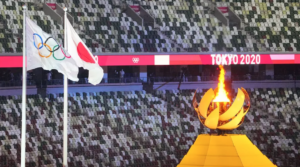Joanna Seddon, Managing Partner, Presciant
The most valuable sports brands are worth billions of dollars, whether they are event brands, like the Premier League, Superbowl, or Formula One, or individual team brands such as Manchester United and the Dallas Cowboys. Their value is roughly comparable to the Coca-Cola brand, even if not as many billions as tech giant brands Apple, Google, or PayPal.
The Olympics was the most valuable of all sports brands, because of its ability to unite, excite and inspire almost everyone on the planet, by showcasing the pinnacle of what humans can physically achieve.
This is why companies such as Visa, MacDonald’s, Toyota, Samsung and P&G have paid millions to associate their brands with the Olympic brand, hoping that sparks from its golden halo of excellence and global unity will fall on them.
Behind the glamor of the Olympics, there has always been skullduggery. The brand has survived, ties to undesirable regimes, from Nazi Germany to the Soviet Union, and multiple corruption scandals most recently, the uncovering of a large-scale athlete doping scheme by the Russian government, forcing its athletes to dodge around and compete as individuals.
But just look at the Tokyo Olympics! Besieged by issues from all sides – a year’s postponement, scrapping of stadium plans as costs ballooned, last-minute dismissals of its composer, Keigo Oyamada for boasting of bullying disabled classmates and creative director Kentaro Kobayashi for making jokes about the holocaust, empty stadiums, competitors collapsing from crashes and the heat, the breakdown of younger athletes under the intolerable stress of performing alone, to mass protests from a Japanese public, appalled at this extravagant show as COVID cases soared.
The extent to which the Olympics brand has been tarnished is shown by Toyota’s decision to pull out from a sponsorship which it paid around $200 M a year, without counting the activation costs, which were many multiples of that. A brand making financial sacrifices to disassociate itself from the Olympics is something completely new.
How much value has the Olympics brand lost? You can argue that it has been declining for years. The brand has become old and stale, not reinvented in its essentials since 1936. It’s telling that the major global sponsors are mostly traditional, long-established brands—Visa, MacDonald’s, Coca-Cola, not the modern tech brands or emerging brands like Samsung was in 19X when, as a small, unknown Korean chip company, it took the bold step of sponsoring the Olympics, catapulting itself to global fame, or the many start-ups who invest in the Superbowl.
Great brands must continually evolve and reinvent themselves, as Apple does every year, and Microsoft has just done under Nadella. The Olympics has not done that. Instead, it has over-extended its product portfolio and diluted its brand value, expanding into sport after sport, trying to mop up golf and tennis, which you can argue are games not sports and which already have their own established global organizations, and adding fringe activities which have little to no global following, for example, synchronized diving. The Chinese are zoning in on these, with a cunning disruption strategy of picking up medals around the edges, to raise their total count.
In our connected world there is no hiding, the holes in the Olympic brand are immediately, globally, visible to all. The Olympic brand right now is associated with greed, corruption, mismanagement, climate change, COVID, social injustice, social unrest, intolerable stress, mass doping and cheating. A long way from the stated Olympian ideals of joy of effort, fair play, respect for others; pursuit of excellence; and balance between body, will and mind.
How much value has the Olympics brand lost? Is it irrevocably tarnished? How long will it survive? The brand desperately needs to be reinvented, with a real purpose, a relevant proposition, designed for the world in which we live today and the new world we are moving into. This kind of transformation is possible—look at Microsoft! But it takes driven leadership, with passionate conviction and a willingness to take risks. Does the Olympic Committee have this?
The brand has a wonderful legacy. There have been recent bright spots—the celebration of youth and the NHS at the London Olympics, the emergence of China at the Beijing Olympics and even now in Tokyo, the teenage kids winning skateboarding golds. It will be fascinating to see what happens. It takes a long time to kill off a great brand. Will the Olympics brand transform and thrive or totter on and peter out?
For more information, please visit: www.presciant.com
